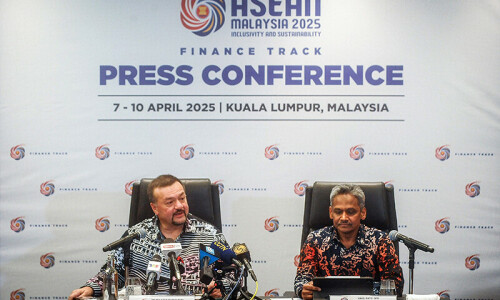LAHORE: A six-member Pakistani delegation left here on Wednesday for New Delhi to attend a meeting of the Permanent Indus Water Commission (PIWC).
Deliberations of the 114th meeting of the body set up under the World Bank-brokered Indus Water Treaty, 1960 — which makes it mandatory for the two parties to meet at least once in a year to discuss issues related to implementation of the treaty — will be held on March 29 and 30. The treaty’s calendar year ends on March 31 and its meetings are held alternatively in Pakistan and India every year.
The previous meeting was hosted by Islamabad in March last year.
The treaty on the use of waters of six rivers originating from India-held Kashmir accepts Pakistan’s exclusive rights on the Indus, Jhelum and Chenab and of India on the Ravi, Sutlej and Beas rivers.
Islamabad has been raising objections to various hydroelectric projects New Delhi had been developing on the Jhelum and Chenab.
The Pakistani delegation will be led by acting Indus Water Commissioner and Joint Secretary (water) of the Ministry of Water and Power Syed Mehr Ali Shah with Sheraz Jameel Memon, Osman Ghani, Tahir Hayat, Omar Farooq and Mohammad Tahir as its members.
The Indian side will be represented by Indus Water Commissioner P.K. Saxena, technical experts and a representative of the Ministry of External Affairs.
Sources say the Pakistani team will raise the issues of 1,000MW Pakal Dul, 850MW Ratle and 48MW Kalnai hydroelectric projects India is developing on the Chenab basin, terming them against the treaty. It is also likely to take up the 340MW Kishanganga project India has already commissioned on the Jhelum river’s tributary.
The meeting is taking place against the backdrop of continuing tensions between the two countries over a host of issues, including harassment of Pakistani diplomats in India.
Facing acute water shortage, Pakistan has already approached the World Bank to resolve the disputes in the International Court of Arbitration rather than appointing neutral experts as it does not come under the jurisdiction of the latter.
Published in Dawn, March 29th, 2018















































